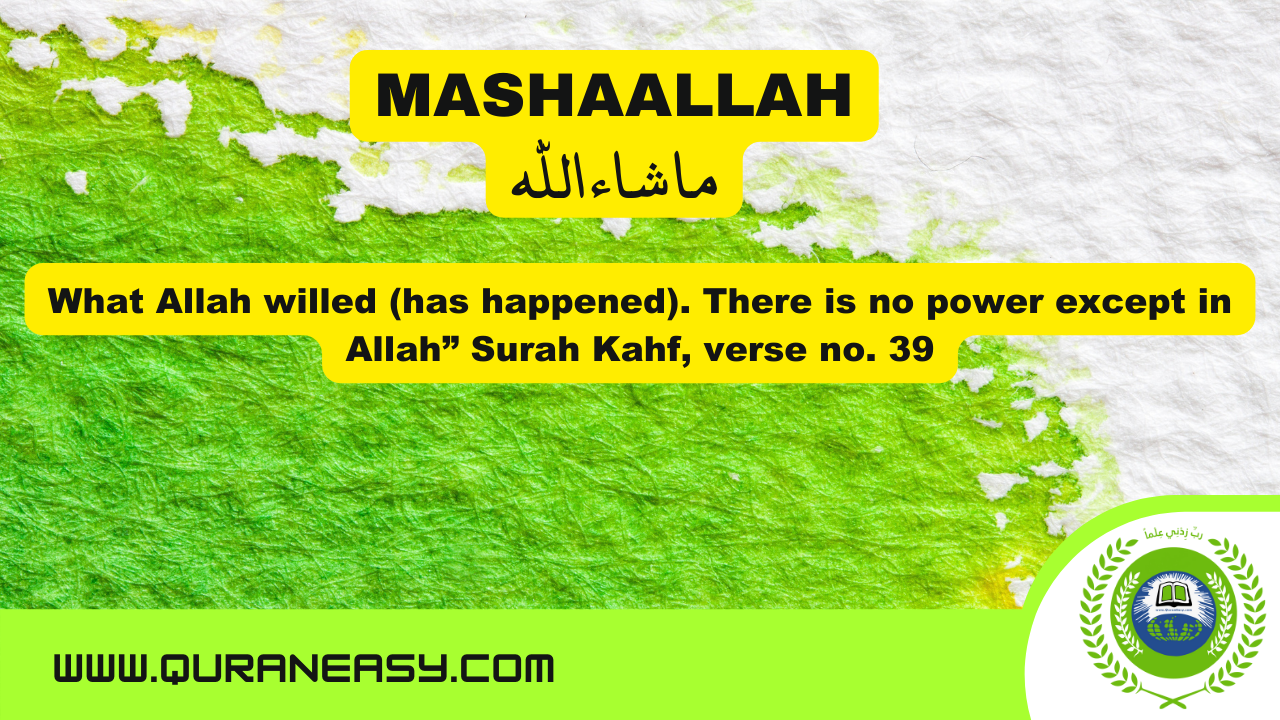Mashallah meaning in English:
Mashallah is usually used to convey thankfulness for any event that has occurred in a person’s life. It’s a method for Muslims to pay respect and a reflection that whatever happens because of God’s will. It’s a method for us to express our gratitude to Allah, the originator of all things, for bestowing a bounty on us. Mashallah is a means of expressing this wonder.
Whenever something nice occurs, some cultures think that chanting Masha Allah will shield them from jealously, the evil eye, or jinns. For example, if you just gave birth to a newborn baby, you would say ‘Mashallah’ to express thankfulness for Allah’s gift and to avoid jeopardizing the infant’s future health.
Ibn ‘Abbas said:
A man said, to the Prophet, ‘Whatever Allah wills and you will.’ He said, ‘You have put an equal with Allah. It is what Allah alone wills. (Sahih (Al-Albani)
When somebody says Mashallah to you, there is no one correct response. If they say it to participate in your happiness, triumph, or success, you can react by responding Jazak Allahu Khayran, that means “may Allah bless you.” If a friend came to your house and said, “What a wonderful house, mashallah,” it would be permissible for you to reply with jazak Allah khair.
MASHALLAH IN ARABIC:
Mashallah is written in Arabic as:
ما شاء الله
Mashallah in Quran:
What Allah willed (has happened). There is no power except in Allah” Surah Kahf, verse no. 39
This is all about praising and appreciating Allah, which leads to Allah’s genuine appraisal (qadr). Memorizing these kalimaat is a recognition that we, as humans, and creation, are really nothing, as well as that the Almighty is the only one who can do anything.
As these sentences (verses) revolve around recognizing and acknowledging Allah’s might and boundless power, one feels closer to Him.
When you comprehend its significance and delve further into how as well as why Allah is the only doer of all things (whether it the twitching of your eye or the emergence of the Sun), miracles begin to occur in your everyday life.
According to the Quran, a man who failed to admit Allah’s blessings on him was forced to lose his whole crop and fruit farm since they have not said mashallah LA quwwata illa billa while looking at his harvest with vanity and ego, and without thanking Allah for this blessing.
And covet not the thing in which Allah hath made some of you excel others. Unto men a fortune from that which they have earned, and unto women a fortune from that which they have earned. (Envy not one another) but ask Allah of His bounty. Lo! Allah is ever Knower of all things.” (4:32) An-Nissa.
MASHALLAH OR INSHALLAH, which is better?
The Mashallah and the Inshallah are two words that sound similar and have similar definitions, which is why it’s easy to become confused between the two phrases. The main difference is inshallah is said to wish for a future result:
Mashallah = Allah has willed
Inshallah = If Allah wills it.
Inshallah can be expressed as follows: “I pray for the delivery of a healthy baby, inshallah.”
Example of Mashallah: *after giving birth* Mashallah, what a beautiful, healthy baby you have.
Protection and defense against the evil eye with MaShaAllah:
It protects us from the evil eye. Someone who is envious of our success, prosperity, health, kids as well as wedding, and other worldly blessings is likely to cast an evil eye on us. Mashallah, the most potent weapon versus the evil eye and envious souls intent on sending negative vibes to us and damaging our material well-being is la quwwata illa billa. Recite this dua on a routine basis to master it.
The influence of an evil eyes is a fact; if anything would precede the destiny it would be the influence of an evil eye, and when you are asked to take a bath (as a cure) from the influence of an evil eye, you should take bath.” [Sahih Muslim (2188)]
When one sees something in his brother that astonishes him as well as wants to avoid giving him the evil-eye, he says: “Maa shaa’ Allaah tabaarak Allaah” or “Maa shaa’ Allaah laa quwwata illaa billaah,” reasoning that this is the Dhikr (commemoration) that is to be said at times of astonishment to squeeze (prevent) the evil-eye That’s why, if you don’t say “Maa shaa’ Allaah” when you express your admiration for one of them – whether it’s for his riches, his house, his son, or his attire – he’ll start to be afraid that you’ll give him the evil eye which is true because evil eye is real.
Our faith, Islam, is the only one that encourages love and affection, regardless of faith or language. Islamic phrases such as Masahallah are an example of a tongue.
We Muslims must urge others to use these expressions in their everyday conversations so that we can reap the benefits that Allah Almighty has promised.
We should look for examples in the Quran, that employs these Islamic terminology, for guidance. This would bolster our convictions and inspire Muslims to embrace the use of Masahallah Tabarak Allah.
What does Mashallah means:
“What Allah wishes” is the precise MashAllah meaning. Nevertheless, because it is used so frequently in our daily interactions, its meaning has shifted. As you may have seen, we usually say “MashAllah” when we receive good news or see anything wonderful or nice. It’s now somewhat the Exact translation of “oh my lord” and “wow,” which I believe is meaningless because it’s not truly stated with Allah in mind.
Returning to the original, expressing “Mashallah” with regard to its true connotation of “what Lord wishes” is stated when good news is received as a gesture to fight the thought of envy that may form in the hearts and minds of the envious.
This makes a great deal of sense. It’s an effort to encourage happiness and reject jealousy at a time where envy is easily acquired. Regrettably, those who are naturally envious continue to be envious. However, the MashAllah meaning “what Allah wishes,” implies that everything originates from Allah, and that instead of enviously wishing for something nice that somebody has, we should be grateful for what Allah has provided us and turn to Him through all our desires.





Leave A Comment